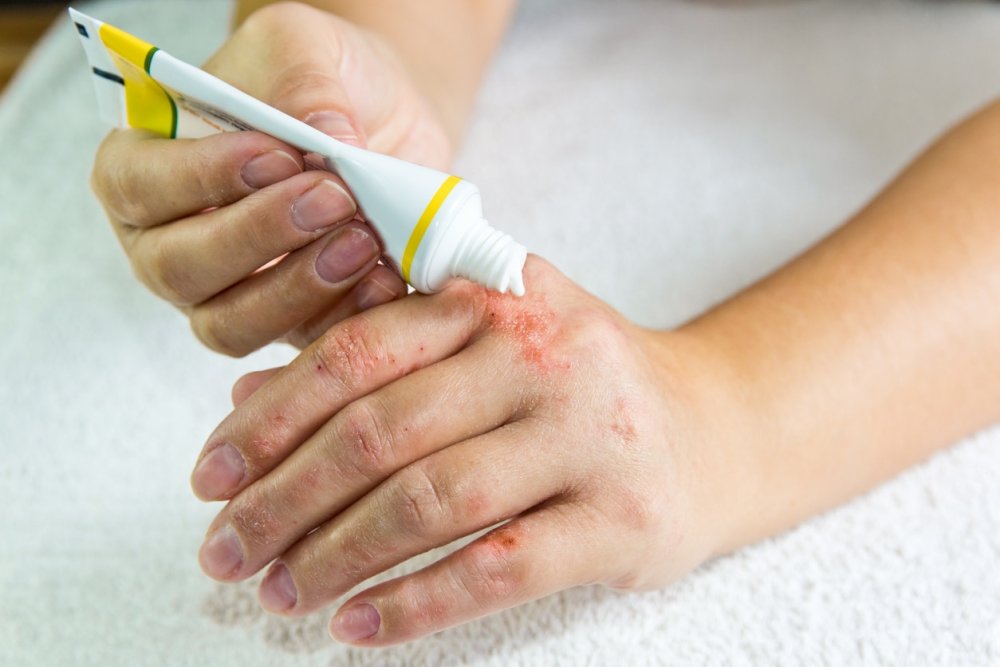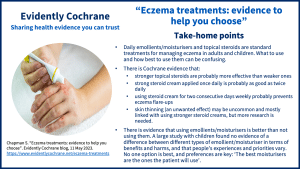Take-home points
As someone who had eczema for many years, and mum to two children with it, I have been all too familiar with what a misery it can be and the uncertainties about how best to manage it. What should I be doing – or not doing? Which creams? How often? What about side effects? On it goes. With over 100 different moisturisers being prescribed by NHS doctors, more information from reliable research could reduce confusion and waste and make for better decisions about treatmentSomething done with the aim of improving health or relieving suffering. For example, medicines, surgery, psychological and physical therapies, diet and exercise changes..
Researchers from Cochrane have brought together the best available evidence on emollients, moisturisers, and steroid creams for adults and children with eczema, providing really helpful information for those of us making choices about those treatments. Also helpful are the results of a studyAn investigation of a healthcare problem. There are different types of studies used to answer research questions, for example randomised controlled trials or observational studies. funded by the UK’s National Institute for Health and Care Research, the Best Emollients for Eczema (BEE) study, which focused on children.
Treating eczema
Eczema is a common skin condition that can have a big impact on quality of life. It varies in severity, from dry skin with occasional itchy inflamed patches to widespread eczema with skin that sometimes becomes infected.
There are treatments to help relieve the symptoms of eczema. The main treatments are moisturisers/emollients used daily plus topical steroids (also called corticosteroids) used less often. ‘Topical’ just means that they are applied to the skin.
The terms ‘emollient’ and ‘moisturiser’ are often used interchangeably. There are four main types: lotions (thin), creams, gels, and ointments (thick).
‘The best moisturisers are the ones the patient will use’
A Cochrane ReviewCochrane Reviews are systematic reviews. In systematic reviews we search for and summarize studies that answer a specific research question (e.g. is paracetamol effective and safe for treating back pain?). The studies are identified, assessed, and summarized by using a systematic and predefined approach. They inform recommendations for healthcare and research. Emollients and moisturisers for eczema (February 2017) found evidence of some benefits of using emollients/moisturisers compared to not using any, including reduced itching, fewer flare-ups and increasing the time between them, and less need for topical steroids.
There wasn’t evidence to show whether some emollients/moisturisers or their ingredients are better than others.
In 2022, the results of the Best Emollients for Eczema (BEE) study were published, comparing the effectivenessThe ability of an intervention (for example a drug, surgery, or exercise) to produce a desired effect, such as reduce symptoms. and safetyRefers to serious adverse effects, such as those that threaten life, require or prolong hospitalization, result in permanent disability, or cause birth defects. of the four main types of emollient in children with eczema, aged 6 months to 12 years. The researchers found there was no evidence of a difference between the types, either in how well they worked or in unwanted effects such as skin redness and itching – reactions which were common with all of them. They also interviewed some of the parents and children taking part in the study to find out about their experiences and preferences. People’s experiences varied a lot within each type of emollient and people prioritised different aspects – some people liked emollients that were quickly absorbed while others wanted one that formed a more obvious layer on the skin, for example.
That no one option is best, and that individual preferences are key, are important messages from the study. Consultant dermatologist and researcher Professor Hywel Williams said of the study, “At last we have evidence that supports the saying, ‘The best moisturisers are the ones the patient will use’.” This seems to me a very empowering message!
Topical steroids
Topical steroids (also called topical corticosteroids) are used to prevent or reduce inflammation and irritation and come in a variety of forms including creams and ointments. They also come in four different strengths: mild (such as hydrocortisone cream), moderate, potent (strong) and very potent. What to use and how best to use them can be confusing.
The Cochrane Review Strategies for using topical corticosteroids in children and adults with eczema (March 2022) found evidence that:
- stronger topical steroids are probably more effective than weaker ones
- strong steroid cream used once a day is probably as good as using it twice a day
- using steroid cream for two days in a row every week probably prevents eczema flare-ups
The review authors say that “Most participants had a good response to topical corticosteroids, regardless of the type of topical corticosteroid used and when or how it was applied”.
Skin thinning can be an unwanted effect of steroid creams. A third of the studies looked for this. There were very few people who had it and mostly those using stronger steroid creams, but there needs to be more research on this.
This is all so helpful I think, but of course, we have more questions that the research doesn’t answer, as the review authors point out. For instance, there wasn’t evidence on how branded creams compare with generic ones, or on time between using an emollient and a steroid cream. Nor do we know what happens over a long period of time – important given that we’re talking about managing a long-term condition.
Deciding what’s best for you or your child
Evidence on the possible benefits and harms of treatments is a useful thing to be able to consider when making choices, but it’s only ever part of the picture. Your doctor will be able to give information and advice based on this and their clinical expertise, but just as important are things that are personal to you. The burden of treatment can be heavy, and so can the costs if you have to buy creams, soap substitutes and so on, or pay prescription charges.
It can be helpful to think BRAIN: What are the Benefits, Risks, Alternatives, what do I want and what if I do Nothing? These can be good questions to talk about with a health professional when making a health decision. You can read about this and more in our blog Making health decisions: things that can help.
More information
- National Eczema Society Information and advice
- NHS Atopic eczema
- If you might be interested in taking part in research on eczema, there are details of studies from the UK’s National Institute of Health research here
Join in the conversation on Twitter with @CochraneUK @SarahChapman30 or leave a comment on the blog.
Please note, we cannot give specific medical advice and do not publish comments that link to individual pages requesting donations or to commercial sites, or appear to endorse commercial products. We welcome diverse views and encourage discussion but we ask that comments are respectful and reserve the right to not publish any we consider offensive. Cochrane UK does not fact-check – or endorse – readers’ comments, including any treatments mentioned.
Sarah Chapman has nothing to disclose.




I found the blog post on eczema treatments to be incredibly informative and insightful. It’s refreshing to see a comprehensive overview of various treatment options, from traditional therapies to emerging innovations. As someone who struggles with eczema, I appreciate the emphasis on holistic approaches and the importance of individualized care. The inclusion of evidence-based research adds credibility to the recommendations provided, making it easier for readers to make informed decisions about their eczema management. Overall, a valuable resource for anyone navigating the challenges of eczema.
That’s great to hear, thank you.
Sarah Chapman [Blogger and Editor]
What an insightful article on eczema treatments! The comprehensive overview and evidence-based approach provide valuable guidance for those navigating the challenges of eczema. Appreciate the focus on informed choices.
Another important and relevant blog post! ‘Misery’ is absolutely the correct term to describe dealing with eczema! But this post has lots of great evidence-based, practical takeaways. Thank you, Sarah!